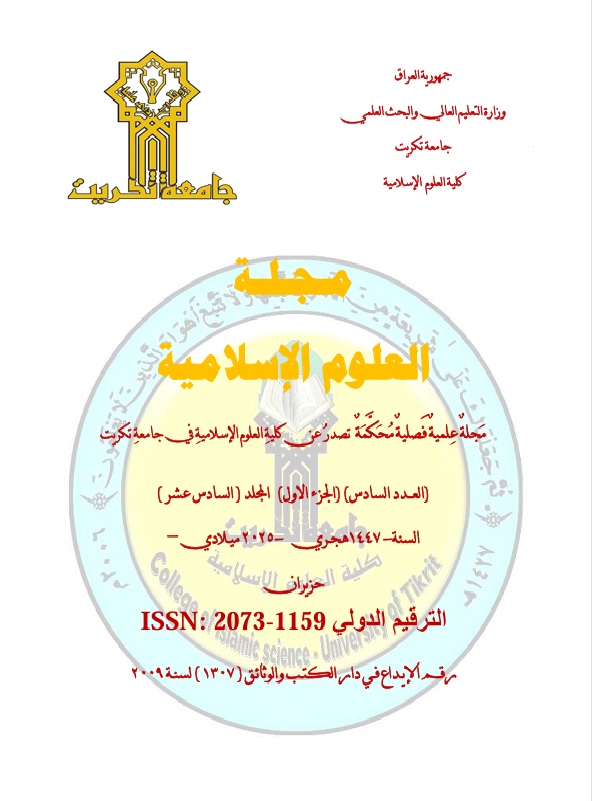Abstract
ABSTRACT
Homosexuality is one of the behavioral phenomena that humanity has been affected with since ancient times. The Glorious Qur’an referred to this issue through the story of the people of Lot and their immoral actions. Over time, this phenomenon has fluctuated in prevalence, but it has been significantly increased in the modern era due to several factors, including the development of communication technologies and the efforts of some international organizations and Western countries to legalize homosexuality, permit same-sex marriage, and protect homosexual rights.
Given the impact of these developments on Islamic societies, this study aims to clarify the Islamic rulings on homosexuality from a legal and objectives-based perspective that aligns with human nature — a central concern of Islamic law. The research addresses the legal foundations of these rulings through Qur’anic and Prophetic texts, reviews the opinions of scholars and Islamic schools of thought, and analyzes the psychological and social effects of this phenomenon on individuals and society.
The study adopts both inductive and analytical methodologies to highlight the Islamic legal objectives (maqāṣid al-sharīʿah) behind the prohibition of homosexuality- particularly the preservation of lineage, morality, and social stability.
Homosexuality is one of the behavioral phenomena that humanity has been affected with since ancient times. The Glorious Qur’an referred to this issue through the story of the people of Lot and their immoral actions. Over time, this phenomenon has fluctuated in prevalence, but it has been significantly increased in the modern era due to several factors, including the development of communication technologies and the efforts of some international organizations and Western countries to legalize homosexuality, permit same-sex marriage, and protect homosexual rights.
Given the impact of these developments on Islamic societies, this study aims to clarify the Islamic rulings on homosexuality from a legal and objectives-based perspective that aligns with human nature — a central concern of Islamic law. The research addresses the legal foundations of these rulings through Qur’anic and Prophetic texts, reviews the opinions of scholars and Islamic schools of thought, and analyzes the psychological and social effects of this phenomenon on individuals and society.
The study adopts both inductive and analytical methodologies to highlight the Islamic legal objectives (maqāṣid al-sharīʿah) behind the prohibition of homosexuality- particularly the preservation of lineage, morality, and social stability.
Keywords
Homosexuality
Marriage
Nature
rulings
sodomy.
Abstract
تُعدّ المثلية الجنسية من الظواهر السلوكية التي ابتُليت بها البشرية منذ العصور الأولى، وقد ظل هذا البلاء يتفاوت في انتشاره عبر العصور، حتى تفاقم في العصر الحديث بفعل عوامل متعددة، من أبرزها تطور وسائل الاتصال، وسعي بعض المنظمات الدولية والدول الغربية إلى تقنين المثلية الجنسية، والسماح بالزواج المثلي، ومنح المثليين حماية قانونية. ونظرًا لانعكاس هذا الواقع على المجتمعات الإسلامية، جاءت هذه الدراسة لتسلط الضوء على الأحكام الشرعية المتعلقة بالمثلية الجنسية، من منطلق مقاصدي يراعي الفطرة الإنسانية التي جاءت الشريعة لحفظها وصيانتها، إذ لا يوجد في الأدلة الشرعية ما يدل على حكم غير التحريم، وقد انعقد على ذلك إجماع الأمة، وما أعنيه بـ (أحكام المثلية) هو جملة الأدلة النقلية والعقلية ، والمقاصدية التي تُسهم في تثبيت هذا الحكم وتعضيده وبيان آثاره، ومواجهة انتشاره، انطلاقًا من مقاصد الشريعة في حفظ الدين والنفس والنسل.
يتناول البحث التأصيل الفقهي للمثلية، ويُبيّن موقف الشريعة الإسلامية من هذه الظاهرة، مستندًا إلى النصوص القرآنية والنبوية، مع استعراض أقوال العلماء والمذاهب الفقهية، وتحليل الآثار النفسية والاجتماعية المترتبة على انتشار هذه الظاهرة. وقد اعتمد الباحث أتباع المنهج الأستقرائي في تناول أحكام المثلية قدر الأمكان، وذلك بجمع الأدلة الشرعية الجزئية من النصوص القرآنية والحديثية وأقوال العلماء، واستقرائها للوصول إلى الحكم الكلي الذي انعقد عليه الإجماع، وهو التحريم، ثم بيان مقاصده وآثاره في حفظ الفطرة والمجتمع و المنهج الاستنباطي والتحليلي في تتبع الأحكام والعلل الشرعية، لإبراز مقصد الشريعة في حفظ النسل، وصيانة الأخلاق، وتحقيق الاستقرار المجتمعي.
يتناول البحث التأصيل الفقهي للمثلية، ويُبيّن موقف الشريعة الإسلامية من هذه الظاهرة، مستندًا إلى النصوص القرآنية والنبوية، مع استعراض أقوال العلماء والمذاهب الفقهية، وتحليل الآثار النفسية والاجتماعية المترتبة على انتشار هذه الظاهرة. وقد اعتمد الباحث أتباع المنهج الأستقرائي في تناول أحكام المثلية قدر الأمكان، وذلك بجمع الأدلة الشرعية الجزئية من النصوص القرآنية والحديثية وأقوال العلماء، واستقرائها للوصول إلى الحكم الكلي الذي انعقد عليه الإجماع، وهو التحريم، ثم بيان مقاصده وآثاره في حفظ الفطرة والمجتمع و المنهج الاستنباطي والتحليلي في تتبع الأحكام والعلل الشرعية، لإبراز مقصد الشريعة في حفظ النسل، وصيانة الأخلاق، وتحقيق الاستقرار المجتمعي.
Keywords
المثلية ، الزواج ، الأحكام ، اللواط ، الفطرة
